七年级上册英语阅读理解及答案
【英语】英语七年级英语上册阅读理解及答案

【英语】英语七年级英语上册阅读理解及答案一、七年级英语上册阅读理解专项目练习(含答案解析)1.阅读理解The Volleyball ClubThe school volleyball club wants new members! We have good players from the school team. They can help you enjoy the game. We practise for an hour every afternoon from Wednesday to Friday.Go to your PE teacher and buy sports shoes if you want to be with us.Girls' Volleyball MatchTeam: No.1 Middle School vs No. 2 Middle SchoolTime: 2:30 p.m.—4:30 p.m., October 21stPlace: Xuzhou Sports CentreCome for our school team. We have twenty tickets (票)for every class. Go to your PE teacher for the tickets before Friday.Please wear your school uniform (校服) at the sports centre.(1)Members of the Volleyball Club practise a week.A. onceB. twiceC. three timesD. four times(2)What must you buy if you want to join the Volleyball Club?A. B. C. D.(3)What time does the volleyball match start?A. At twenty to three in the afternoon.B. At two thirty in the afternoon.C. At five o'clock in the afternoon.D. At twenty past two in the afternoon.(4)Students can go to their for tickets.A. PE teachersB. classmatesC. parentsD. grandparents (5)Students can't get a ticket on .A. TuesdayB. WednesdayC. ThursdayD. Saturday【答案】(1)C(2)B(3)B(4)A(5)D【解析】【分析】文章大意:该文是一个排球俱乐部的广告。
最新英语七年级英语上册阅读理解及答案
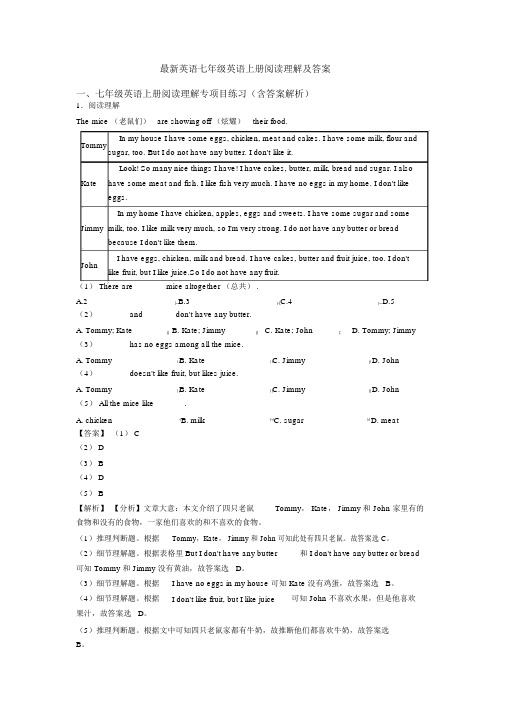
最新英语七年级英语上册阅读理解及答案一、七年级英语上册阅读理解专项目练习(含答案解析)1.阅读理解The mice (老鼠们)are showing off (炫耀)their food.TommyIn my house I have some eggs, chicken, meat and cakes. I have some milk, flour and sugar, too. But I do not have any butter. I don't like it.Look! So many nice things I have! I have cakes, butter, milk, bread and sugar. I alsoKate have some meat and fish. I like fish very much. I have no eggs in my home. I don't like eggs.In my home I have chicken, apples, eggs and sweets. I have some sugar and some Jimmy milk, too. I like milk very much, so I'm very strong. I do not have any butter or bread because I don't like them.JohnI have eggs, chicken, milk and bread. I have cakes, butter and fruit juice, too. I don't like fruit, but I like juice.So I do not have any fruit.(1) There are _______mice altogether (总共) .A.2B.3C.4D.5(2) _______and _______don't have any butter.A. Tommy; KateB. Kate; JimmyC. Kate; JohnD. Tommy; Jimmy (3) _______has no eggs among all the mice.A. TommyB. KateC. JimmyD. John(4) _______doesn't like fruit, but likes juice.A. TommyB. KateC. JimmyD. John(5) All the mice like_______.A. chickenB. milkC. sugarD. meat【答案】(1) C(2) D(3) B(4) D(5) B【解析】【分析】文章大意:本文介绍了四只老鼠Tommy, Kate, Jimmy 和 John 家里有的食物和没有的食物,一家他们喜欢的和不喜欢的食物。
英语七年级英语上册阅读理解及答案(word)1
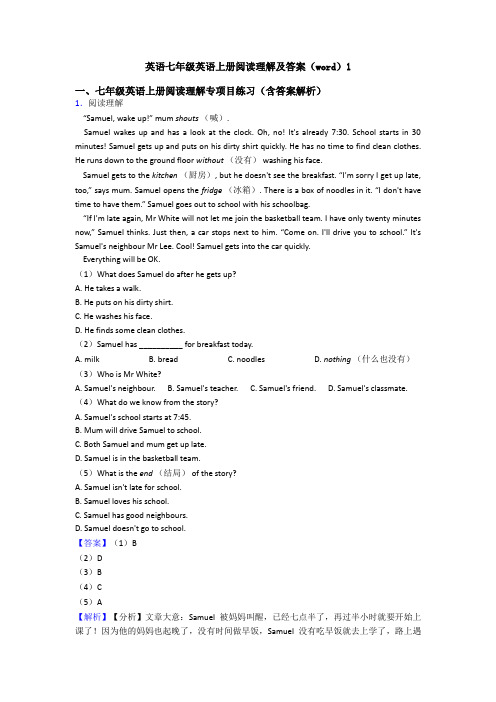
英语七年级英语上册阅读理解及答案(word)1一、七年级英语上册阅读理解专项目练习(含答案解析)1.阅读理解“Samuel, wake up!” mum shouts (喊).Samuel wakes up and has a look at the clock. Oh, no! It's already 7:30. School starts in 30 minutes! Samuel gets up and puts on his dirty shirt quickly. He has no time to find clean clothes. He runs down to the ground floor without (没有) washing his face.Samuel gets to the kitchen (厨房), but he doesn't see the breakfast. “I'm sorry I get up late, too,” says mum. Samuel opens the fridge(冰箱). There is a bo x of noodles in it. “I don't have time to have them.” Samuel goes out to school with his schoolbag.“If I'm late again, Mr White will not let me join the basketball team. I have only twenty minutes now,” Samuel thinks. Just then, a car stops next to him. “Come on. I'll drive you to school.” It's Samuel's neighbour Mr Lee. Cool! Samuel gets into the car quickly.Everything will be OK.(1)What does Samuel do after he gets up?A. He takes a walk.B. He puts on his dirty shirt.C. He washes his face.D. He finds some clean clothes.(2)Samuel has __________ for breakfast today.A. milkB. breadC. noodlesD. nothing (什么也没有)(3)Who is Mr White?A. Samuel's neighbour.B. Samuel's teacher.C. Samuel's friend.D. Samuel's classmate.(4)What do we know from the story?A. Samuel's school starts at 7:45.B. Mum will drive Samuel to school.C. Both Samuel and mum get up late.D. Samuel is in the basketball team.(5)What is the end (结局) of the story?A. Samuel isn't late for school.B. Samuel loves his school.C. Samuel has good neighbours.D. Samuel doesn't go to school.【答案】(1)B(2)D(3)B(4)C(5)A【解析】【分析】文章大意:Samuel被妈妈叫醒,已经七点半了,再过半小时就要开始上课了!因为他的妈妈也起晚了,没有时间做早饭,Samuel没有吃早饭就去上学了,路上遇到了邻居Mr. Lee.,邻居开车带他及时赶到了学校。
七年级英语上册阅读理解练习题(含答案)
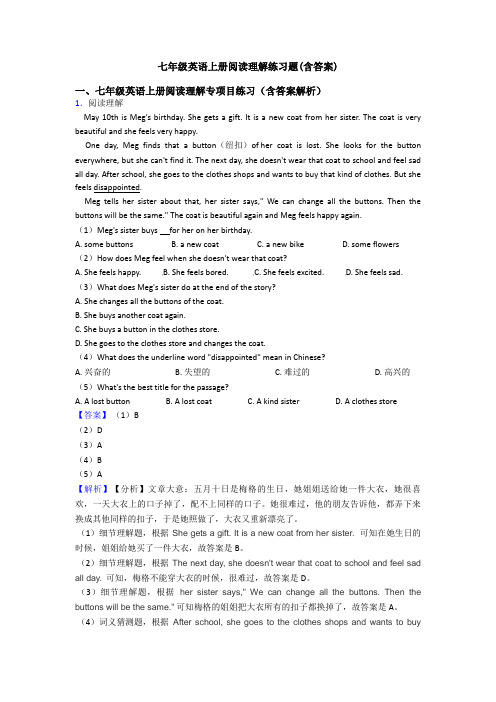
七年级英语上册阅读理解练习题(含答案)一、七年级英语上册阅读理解专项目练习(含答案解析)1.阅读理解May 10th is Meg's birthday. She gets a gift. It is a new coat from her sister. The coat is very beautiful and she feels very happy.One day, Meg finds that a button(纽扣)of her coat is lost. She looks for the button everywhere, but she can't find it. The next day, she doesn't wear that coat to school and feel sad all day. After school, she goes to the clothes shops and wants to buy that kind of clothes. But she feels disappointed.Meg tells her sister about that, her sister says," We can change all the buttons. Then the buttons will be the same." The coat is beautiful again and Meg feels happy again.(1)Meg's sister buys for her on her birthday.A. some buttonsB. a new coatC. a new bikeD. some flowers(2)How does Meg feel when she doesn't wear that coat?A. She feels happy.B. She feels bored.C. She feels excited.D. She feels sad.(3)What does Meg's sister do at the end of the story?A. She changes all the buttons of the coat.B. She buys another coat again.C. She buys a button in the clothes store.D. She goes to the clothes store and changes the coat.(4)What does the underline word "disappointed" mean in Chinese?A. 兴奋的B. 失望的C. 难过的D. 高兴的(5)What's the best title for the passage?A. A lost buttonB. A lost coatC. A kind sisterD. A clothes store【答案】(1)B(2)D(3)A(4)B(5)A【解析】【分析】文章大意:五月十日是梅格的生日,她姐姐送给她一件大衣,她很喜欢,一天大衣上的口子掉了,配不上同样的口子。
【英语】七年级英语上册阅读理解知识点总结及经典习题(含答案)(word)

【英语】七年级英语上册阅读理解知识点总结及经典习题(含答案)(word)一、七年级英语上册阅读理解专项目练习(含答案解析)1.阅读理解Hi, I'm John. I study in a middle school. Every morning, I get up at half past six and I go to school at seven. Lessons begin at eight. We have four lessons in the morning and three lessons in the afternoon. English is my favourite lesson, because we often play games in the English class.I have lunch at school. I like the school lunch and I always have rice with meat and vegetables. After lunch I often talk with my classmates.In the afternoon, lessons start at one o'clock and finish at four o'clock. I play games with my friends after school and then go home at half past four. I work hard every day. In the evening, I do my homework and read books. At nine o'clock I go to bed. I'm really busy every day but I like it.(1)What time does John go to school?A. At 6. 30 a. m.B. At 7. 00 a. m.C. At 8. 00 a. m.D. At 8. 30 a. m.(2)What lesson does he like best?A. English.B. Maths.C. Chinese.D. Music(3)What does he often do after lunch?A. Playing games.B. Chatting with his classmates.C. Having a rest.D. Playing balls.(4)Where does he do his homework?A. In the classroom.B. In the school.C. At home.D. At his classmate's home.【答案】(1)B(2)A(3)B(4)C【解析】【分析】本文讲述了John的日常。
【英语】英语七年级英语上册阅读理解100及答案经典1
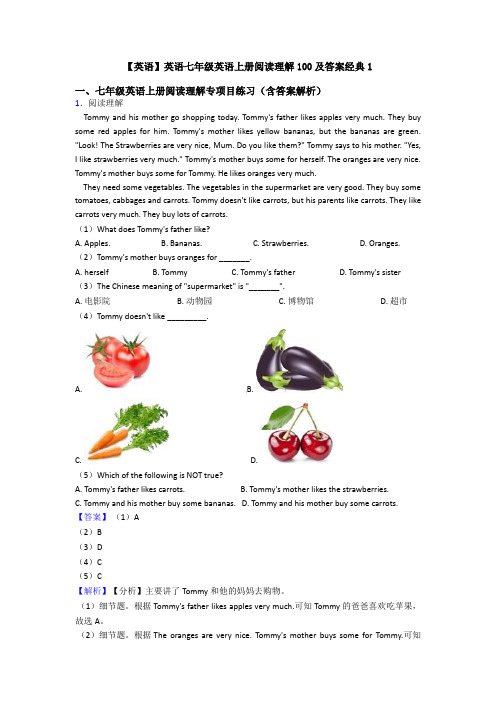
【英语】英语七年级英语上册阅读理解100及答案经典1一、七年级英语上册阅读理解专项目练习(含答案解析)1.阅读理解Tommy and his mother go shopping today. Tommy's father likes apples very much. They buy some red apples for him. Tommy's mother likes yellow bananas, but the bananas are green. "Look! The Strawberries are very nice, Mum. Do you like them?" Tommy says to his mother. "Yes, I like strawberries very much." Tommy's mother buys some for herself. The oranges are very nice. Tommy's mother buys some for Tommy. He likes oranges very much.They need some vegetables. The vegetables in the supermarket are very good. They buy some tomatoes, cabbages and carrots. Tommy doesn't like carrots, but his parents like carrots. They like carrots very much. They buy lots of carrots.(1)What does Tommy's father like?A. Apples.B. Bananas.C. Strawberries.D. Oranges.(2)Tommy's mother buys oranges for _______.A. herselfB. TommyC. Tommy's fatherD. Tommy's sister (3)The Chinese meaning of "supermarket" is "_______".A. 电影院B. 动物园C. 博物馆D. 超市(4)Tommy doesn't like _________.A. B.C. D.(5)Which of the following is NOT true?A. Tommy's father likes carrots.B. Tommy's mother likes the strawberries.C. Tommy and his mother buy some bananas.D. Tommy and his mother buy some carrots.【答案】(1)A(2)B(3)D(4)C(5)C【解析】【分析】主要讲了Tommy和他的妈妈去购物。
七年级上册英语阅读理解题及答案解析
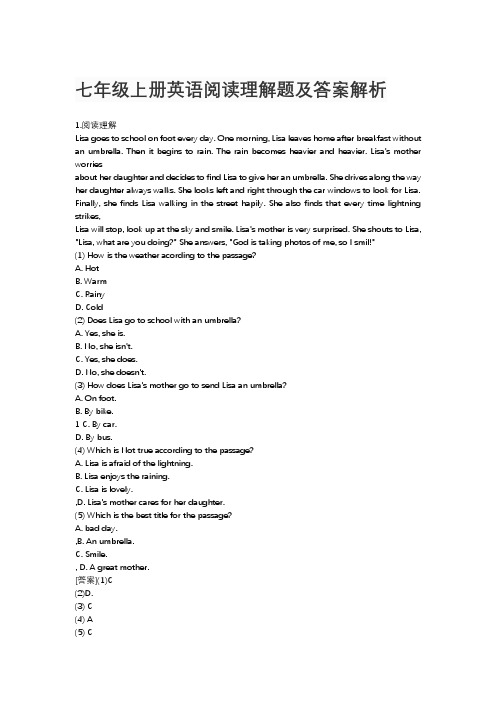
七年级上册英语阅读理解题及答案解析1.阅读理解Lisa goes to school on foot every day. One morning, Lisa leaves home after breakfast without an umbrella. Then it begins to rain. The rain becomes heavier and heavier. Lisa's mother worriesabout her daughter and decides to find Lisa to give her an umbrella. She drives along the way her daughter always walks. She looks left and right through the car windows to look for Lisa. Finally, she finds Lisa walking in the street hapily. She also finds that every time lightning strikes,Lisa will stop, look up at the sky and smile. Lisa's mother is very surprised. She shouts to Lisa, "Lisa, what are you doing?" She answers, "God is taking photos of me, so I smil!"(1) How is the weather acording to the passage?A. HotB. WarmC. RainyD. Cold(2) Does Lisa go to school with an umbrella?A. Yes, she is.B. No, she isn't.C. Yes, she does.D. No, she doesn't.(3) How does Lisa's mother go to send Lisa an umbrella?A. On foot.B. By bike.1 C. By car.D. By bus.(4) Which is Not true according to the passage?A. Lisa is afraid of the lightning.B. Lisa enjoys the raining.C. Lisa is lovely.,D. Lisa's mother cares for her daughter.(5) Which is the best title for the passage?A. bad day.,B. An umbrella.C. Smile., D. A great mother.[答案](1)C(2)D.(3) C(4) A(5) C[解析] [分析] 大意:本文讲述丽萨每天步行去学校,有一天早上丽萨去上学没有带伞,在去学校的路上,天开始下雨,她的妈妈很担心,于是开车给她送伞,但是当她看见丽萨的时候,丽萨正漫步于雨中,见到妈妈面带微笑,妈妈感到很吃惊,于是问丽萨怎么了,丽萨回答是老天在给我拍照,我应该微笑。
人教版英语七年级上册阅读理解专项训练16篇(含答案)
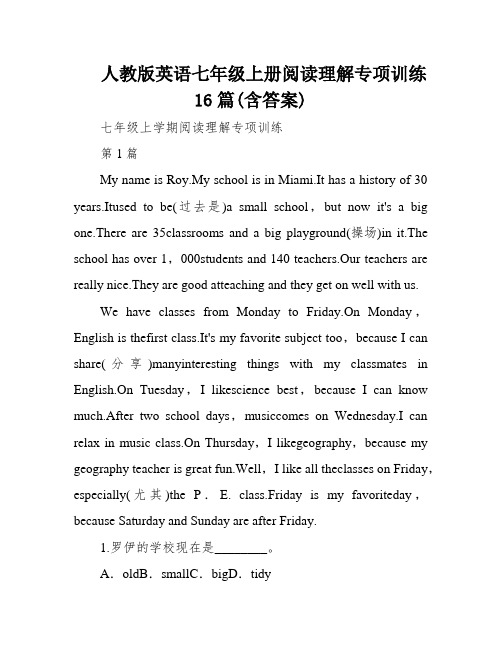
人教版英语七年级上册阅读理解专项训练16篇(含答案)七年级上学期阅读理解专项训练第1篇My name is Roy.My school is in Miami.It has a history of 30 years.Itused to be(过去是)a small school,but now it's a big one.There are 35classrooms and a big playground(操场)in it.The school has over 1,000students and 140 teachers.Our teachers are really nice.They are good atteaching and they get on well with us.We have classes from Monday to Friday.On Monday,English is thefirst class.It's my favorite subject too,because I can share(分享)manyinteresting things with my classmates in English.On Tuesday,I likescience best,because I can know much.After two school days,musiccomes on Wednesday.I can relax in music class.On Thursday,I likegeography,because my geography teacher is great fun.Well,I like all theclasses on Friday,especially(尤其)the P.E. class.Friday is my favoriteday,because Saturday and Sunday are after Friday.1.罗伊的学校现在是________。
- 1、下载文档前请自行甄别文档内容的完整性,平台不提供额外的编辑、内容补充、找答案等附加服务。
- 2、"仅部分预览"的文档,不可在线预览部分如存在完整性等问题,可反馈申请退款(可完整预览的文档不适用该条件!)。
- 3、如文档侵犯您的权益,请联系客服反馈,我们会尽快为您处理(人工客服工作时间:9:00-18:30)。
初一英语阅读理解技巧在做英语阅读时,首先通读全文,不要被某个或某些自己不熟悉的单词所困扰,了解大概意思。
然后看问题,带着问题精读全文,同时选择答案,必要时用排除法,注意,文章中一般都会有答案,有的可以直接找到,英美人并不愿意把问题弄得太深奥,不必想得太复杂,很多都是直接了当的,千万别自己发挥想象。
但不得不说,平时多积累词汇量的话,答题可能就会主动一些,有把握一些。
一、初中阅读理解考查的主要内容。
首先,初中英语试题中的阅读文章题材多样(涉及政治经济、社会文化、风俗习惯、历史地理、科学技术等各个方面),体裁形式丰富(包括记叙文、说明文、议论文、应用文以及新闻报道、广告、通知、操作说明、表格等),这就需要考生在平时对各方面的知识都有所积累。
其次,阅读理解主要是考查考生综合运用所学语言知识的能力,包括阅读、理解、归纳概括、逻辑推理以及对材料的评估能力等。
在阅读技巧上,考生要注意文章的个别词或句子、文章的某细节或情节、文章的主题或背景知识、文章的结论或结局、文章内涵的寓意等。
最后,从问题设置上可以将问题总结为四种类型:(一)直接题目:这种题目比较简单,只要通读全文,了解文中所叙述的重要事实或细节,就可以解答出来,有的甚至可以从文章的原句中直接找到答案。
此类考查事实和细节的题目大多数是针对文章的细节设计的。
(二)理解性问题:要求对文中个别难词、关键词、词组或句子做出解释。
解答这类题目时需要对有关的上下文,甚至整篇文章的内容建立准确、立体的理解才能做出正确答案。
此类猜测词义的题目,要求考生根据上下文确定某一特定的词或短语的准确含义。
(三)推理性题目:这种题目考生往往不能直接从文中找到答案,而需要根据上下文及其相互间的关系或对整篇文章进行深层理解后,才能找到答案。
有时甚至还得考虑作者的主旨、倾向等因素加以推理,才能获得正确答案。
此类题目主要考查的是句与句之间,段与段之间的逻辑关系。
(四)概括性题目:要求考生在阅读和理解全文的基础上对文章做出归纳、概括或评价。
此类考查主旨和大意的题大多数针对段落(或短文)的主题思想,标题或目的。
解这种题目时,不能只凭文中的只言片语而断章取义,比如涉及文章的标题、主题、结论、结局等有关问题,都需要在细读全文的基础上,结合所学语言知识、背景知识、生活常识、专业知识进行逻辑思维推理判断,从而获取文章中内含的信息。
二、阅读理解题的解题技巧。
明确了阅读理解题的考查要点以后,我们现在来研究破解阅读理解题的方法和技巧。
1. 获取段落的主旨和大意。
最有效的办法是找出主题句。
一篇文章(或一段文章)通常都是围绕一个中心意思展开的。
而这个中心意思往往由一个句子来概括。
这个能概括文章或段落中心意思的句子叫做主题句。
因此,理解一个段落或一篇文章的中心意思首先要学会寻找主题句。
主题句一般具有三个特点:1)表述的意思比较概括,相对其主句来看,这种概括性更为明显。
2)句子结构较简单,多数都不采用长、难句的形式。
3)段落中其它的句子必定是用来解释、支撑或发展主题句所表述的主题思想的。
在一个段落中,大部分主题句的位置有两种:1)主题句在段首。
这种情况相当普遍。
一般新闻报道、说明文,议论文大都采用先总述,后分述的叙事方法。
2)主题句在段末。
用归纳法写文章时,往往表述细节的句子在前,概述性的句子在后,并以此结尾。
这种位于句末的主题句往往是对前面细节的总结,归纳或结论。
2. 根据上下文猜测词义。
猜测词义也是一种英语阅读能力。
英语阅读理解试题中有不少这样的题目。
任何一个实词,只有在一定的上下文中才能表示一个确定的词义。
上下文的作用就是帮助确定上下文中的词、短语或句子的意义。
据此,我们可以尽可能地利用上下文来猜测词义,即从已知推求未知,也就是用我们所熟悉的词或短语来猜测我们不熟悉的词的词义。
猜测词义时,我们可以从三个方面来考虑:1)根据上下文已知部分进行逻辑上的推理。
根据上下文猜测词义的方法有下列几种:根据定义或解释猜测词义;根据并列、同位关系猜测词义;根据同义、反义、因果关系猜测词义。
2)运用语法知识进行语法分析。
3)依靠常识和经验做出判断。
3. 确定细节和事实。
在阅读理解题目中,有相当一部分是考查细节和事实的题目。
这类题目相对容易一些。
这些题目有两个共同特点:(1)凡属针对特定细节的考题,其正确答案大都可以在阅读材料中找到对应的文字部分作为验证。
这一部分可能是一个词或短语,也可能是一个句子或相关的若干句子,但句式、用词和表达方式不同。
(2)干扰项往往是主体思想与细节混杂,正确答案细节和非正确答案的细节混杂,甚至真假混杂。
因此,要做好阅读理解中的确定细节和事实的题目,一要在文章中找出相应的信息点,二要排除干扰项。
4. 进行合理推断。
所谓推断,就是根据阅读材料中所提供的信息,推断出未知的信息。
即把有关的文字作为已知部分,从中推断出未知部分。
需要推断的有关文字可能是词或句子,也可能是若干句子,甚至是全文。
总之,只要平时善于积累,并熟练运用上述解题技巧,初中阅读理解题就将不再是难题。
七年级上册英语阅读理解及答案Little Tom down the street calls our dog "The keep dog".Zip is a sheepdog. But when Tomtries to say" Seep", it comes out "keep". And in a way Tom is right. Zip is always bringing things hoem for us to keep! I'll tell you about some of them.Zip's first prese nt was a shoe. It was made of gree n silk.We did n't know how Zip found the shoe. But after a mome nt Mary, my bigsister, told methe shoe had a strange smell. I nodded(点头)and held my nose. "What do you thi nk it is?""It smells like someth ing for clea nin g. I thi nk some one tried to clea na spot (污点)off the shoe. Then he put it at the door to dry.""Al ong came Zip. And good-bye shoe!" I said."We should take it back.""We can't ".said my sistter."Maybe little Tom is right," Mary said. "Maybe Zip is a keep dog!"1. The writer and Mary did n't know ____ .A. what Zip's first prese nt wasB. how Zip carried its first prese nt homeC. who owned Zip's first prese ntD. what Zip's first prese nt was made of2. Tom calls Zip "the keep dog"because _____ .A. the dog likes keep ing thingsB. the dog likes playing with shoesC. he does n't know the dog's n ameD. he can't pronounce the word "sheep"well3. What made the shoe stra nge was ____ .A. its colourB.its smellC.its sizeD.that it was a silk one4. The word "keep"i n the last sentence means " __ "A. keep ing things for itselfB. bri nging thi ngs for other to keepC. not letting it run aboutD. tak ing care of a small child5. We can know from the read ing that the dog ____ .A. likes to give prese nts to peopleB. has been kept in at the writer's homeC. has brought some troubleD. likes to be called "the keep dog"An old lady in a plane had a blanket (毯子)over her head and she didnot want to take it off . The air hostess spoke to her, but the old lady said,I have n ever bee n in a pla ne before , and I am frighte ned. I am going to keep this bla nket over my head un til we are back on the ground aga in ! ”Then the captain came. He said, “Madam,l amthe captain of this plane. The weather is fine, there are no clouds in the sky, and everything is going very well. ” But she continued to hide.So the captain turned and started to go back. Then the old lady looked out from un der the bla nket with one eye and said, “ I am sorry, young man, but I don ' t like planes and I am never going to fly again. But I ' ll sayone thing, ” She continued kindly, “You and your wife keep your plane very clean! ”1. An old lady had ________ .A. glassesB. a bla nket over her headC. a coatD. a basket2. A. She didn ' t want to __________ .A. take it offB. turn it offC. get onD. talk about it3. ________ spoke to her .A. The air hostessB. The man n ext to herC. her husba ndD. one of her friends4. The old lady had n ever bee n ________ before .A. abroadB. homeC. in a pla neD. in hospital5. The woman didn ' t like planes and she was never going __________ .A. to fly aga inB. to travelC. to go abroadD. to go homeDick lived in En gla nd. On eday in January he said to his wife, "I'm going to fly to New York n ext week because「ve got some work there." "Where are you going to stay there?" his wife asked. "I don't know yet." Dick answered. "Please send meyour address from there in a telegram (电报)," his wife said. "All right," Dick an swered.He flew to NewYork on January 31st and found a nice hotel in the center of the city. Heput his things in his room and then he sent his wife a telegram. He put the address of his hotel in it.In the eve ning he did n't have any work, so he went to a cin ema. He came out at nine o'clock and said, "Now rm going back to my hotel and have a nice dinn er."He found a taxi (出租车)and the driver said, "Where do you want to go?" But Dick did n't remember the n ame and address of his hotel."Which hotel are my things in?" he said, "A nd what am I going to do toni ght?" But the driver of the taxi did not know. So Dick got out and went into a post office. There he sent his wife another telegram, and in it he wrote, " "Please send me my address at this post office."Choose the right an swer1. Dick flew to New York because __ .A. he went there for a holidayB. he had work thereC. he went there for sightsee ing (观光)D. his home was there2. Why did his wife want a telegram from him?A. Because she did n't know his address yetB. Because she wan ted to go to New York, tooC. Because she might send him ano ther telegramD. Because she could n't leave her husba nd by himself in New York3. Where did Dick stay in New York?A. In the cen ter of the city.B. I n a hotel.C. I n a restaura nt.D. At his frie nd's house.4. Who would send him the n ame and address of his hotel?A. The manager (经理)of his hotel.B. The police office.C. The taxi driver.D. His wife.5. Which of the following is not true?A. Dick stayed at a nice hotel in the cen ter of the city.B. Dick did n't work on the first ni ght of his arrival.C. Dick forgot to send his wife a telegram.D. Dick wan ted to go back to his hotel in a taxi.(四)Bob and Jim once worked in the same factory. One day, Bob lent Jim ten dollars, but then Jim left his work and went to work in another town without pay ing back the mon ey.Bob did n't see Jim for a year, and the n he knew from ano ther frie nd that Jim was in another town and staying at a hotel. So he went there to see him late in the eve ning.Whenhe got to Jim's room, he saw his shoes near the door. "Well, he must be in,” he thought, and kno cked aga in, and said, "I know you are in, Jim.Your shoes are out here.""I've gone out in my boots," an swered Jim.True or False1. Bob and Jim once worked in differe nt factories.2. One day Jim borrowed ten dollars from Bob.3. Jim paid back the moneyto Bob and went to work in another town later.4. Bob had n't see n Jim for a year whe n he lear ned that Jim was in ano ther tow n.(五)I think the most terrible thing in life for my little brother is getting up in the morning.He is almost sick whe n my mother calls, "Herbert! It's seve n o'clock! Get up!"Herbert answers, "I'm coming!" and goes right back to sleep. rm not at all like mybrother. I don't like to go to bed at night but I don't mind getting up in the mornin g. I usually wake up before my mother calls me. I jump out of bed and go into the bathroom to take a shower. I get dressed, brush my teeth, comb my hair, and get ready to go dow nstairs for breakfast as soon as my mother calls.But not Herbert. He just sleeps. A military band (军乐队)in our bedroom could not wake him up. I call him and say, "Get up! Mum will be up here to pull you out of bed if you don't get up immediately!"But he just sleeps. After calling a few more times my mother has to come upstairs and pull Herbert out of bed. It's that way every day with my little brother. Perhaps some day he'll learn to get up on time, but I really don't think so.True or False1. The most terrible thing in life for my little brother is going to school.2. I'm n ot like my brother because I like to go to bed early at ni ght and get up early in the morning.3. I usually jump out of bed and go into the bathroom for a shower before my mother calls.4. When mother calls, Herbert does n't an swer and remai ns in bed.5. My mother ofte n has to go upstairs and pull Herbert out of bed as he refuses to get up.6. Sometimes we have to send for a military band to wake Herbert up.7. The writer thinks some day Herbert will learn to get up on time.In En gla nd, people ofte n talk about the weather because they canexperienee (经历)four seasons in one day. In the morning the weather is warm just like in spring. An hour later black clouds come and then it rains hard. The weather gets a little cold. In the late after noon the sky will be sunny, the sun will beg in to shi ne, and it will be summer at this time of a day.In En gla nd, people can also have summer in win ter, or have win ter in summer. So in win ter they can swim sometimes, and in summer sometimes they should take warm clothes.Whe n you go to En gla nd, you will see that some En glish people usually take an umbrella (伞)or a rain coat with them in the sunny morning, but you should not laugh at them.If you don't take an umbrella or a rain coat, you will regret (后悔)later in the day.1. Why do people in En gla nd ofte n talk about the weather?A. Because they may have four seas ons in one dayB. Because they ofte n have very good weatherC. Because the weather is warm just like in spri ngD. Because the sky is sunny all day2. From the story weknow that when ___________ c ome, there is a heavy rain.A. sunshine and snowB. black cloudsC. summer and win terD. spri ng and autu mn3. "People can also have summer in win ter." Mea ns "it is sometimes too in wi nter."A. warmB. coolC. coldD. rai ny4. In the sunny morning some En glish people usually take a rain coat oran umbrella with them because ________ .A. their friends ask them to do soB. it often rains in EnglandC. they are going to sell themD. they are their favourite things5. The best title (标题)for this passage is _________ .A. Bad Seas onsB. Summer or Win terC. The Weather in En gla ndD. Strange En glish People(七)Mr Brown was going away for a week. Before he left, he said to his son, "if anyone asks for me, you can tell him that your father has bee n out for doing someth ing, and will be back in a week, the n be sure to ask him to sit dow n for a cup of tea.""OK, Dad," said his son. But he wasafraid his son could n't rememberthis, he wrote these words dow n on a piece of paper and gave it to him. His son put it into his small pocket, took it out and looked at it every nowand then.Four days passed, but no one came to see his father. The boy thought that there was no man to come and that the piece of paper was of no more use for him, so he bur nt it that eve ning.The n ext after noon, some one kno cked at the door. The boy ope ned it. A man was sta nding at the door and said, "Where is your father?" The boy put his hand into his pocket at once and looked for the piece of paper. He could not find it. He sudde nly rememberedhe had bur nt it, so he shouted, "No more."The man was very surprised. He asked, "No more? I met your father last week. Whe n did it happe n?""Bur nt yesterday eve nin g."1. Mr Brow n told his son that ___ .A. he would be away from home for four daysB. he would be back in seve n daysC. he would be back in a monthD. he liked a cup of tea2. Mr Brow n wrote the words dow n on ______ .A. the wallB. the doorC. a piece of paperD. his son's pocket3. A man came to visit the boy's father on ________ .A. the sec ond dayB. the third dayC. the fourth dayD. the fifth day4. The man was very surprised because _________ .A. he thought the child's father was deadB. the child did n't ask him to sit dow nC. the child gave him a cup of teaD. he could n't find that piece of paper5. What was bur nt? __________ .A. The piece of paperB. Mr SmithC. The visitorD. The boy(八)Oneof the things to be learnt in a foreign Ianguage is guessing all the time what kind of thi ng to come whe n liste ning to some one talk ing. People do this all the time in their own Ian guage, so it is n ecessary (必要的)todo this in a foreig n Ian guage, too. Here are some examples.1. "What's the matter?" "I went to a party last ni ght, so I …"2. "I feel so tired these days."" I thi nk you'd better …"3. "Of course, she n ever stops talk ing. She is one of the most …"You can see from the above three examples that the con text (上下文)helps a lot in un dersta nding what is being talked about. So "guess ing "is very importa nt in un dersta nding En glish, especially (尤其)spoke n En glish.1. This passage tells us mainly about ________ .A. the importa nee of "guess ing "in lear ning a foreig n Ian guageB. how to guess what one is going to talk aboutC. some examples of right guess ingD. how important it is to guess all the time2. from the con text, we can see maybe the fini shed an swer in EXAMPLE Iis _________ .A. "…so I did n't have a good time."B."…so I went to bed very late."C." ….So I felt unhappy."D." …so I got up very early."3. Maybe the fini shed an swer in EXAMPLE 2 is ______ .A. "I think you'd better have a good rest and take good care of yourself."B. "I think you'd better have something to drink."C. "I think you'd better get some help from your friends."D. "I thi nk you'd better be more careful."4. Maybe the fin ished an swer in EXAMPLE 3 is ____ .A. " …she is one of the most famous film stars."B. " …she is one of the most beautiful women."C. " …she is one of the most famous speakers."D. " .. she is one of the most talkative wome n."5. From the passage we can infer (推断)that guess ing is ______ inlearning a foreig n Ian guage.A. the on ly wayB. more important in spoken English than in written EnglishC. more importa nt tha n any other wayD. more important in written English than in spoken English(九)Un cle Li and Un cle Wang are good frie nds. They live n ext to each other and their farms are both at the foot of the mountain. So they can help each other. But n either of them likes to use his head. They're both poor though they work hard. Most villagers have built new houses, but they still live in the low and broke n houses. They n ever find out why.OnceUncle Li went to town to buy somemedicine for his wife. In the town he heard the apples in a city were expensive. He told Uncle Wang about it as soon as he went back. They decided to carry someapples to the city. They borrowed somemoney from their friends and bought nearly 1,000 kilograms of apples in the villages and carried them to the city on a tractor. Bad luck!A lot of apples has already been carried there when they arrived. A few days later they had to sell them at a low price (价格).They felt un happy and returned to their village."I can't un dersta nd why we susta ined (蒙受)losses in bus in ess while others always profit (盈利)"Un cle Li asked one day."The tractor was too small " Uncle Wang said without thinking. "We'll carry more apples on a truck n ext time!""I agree!" said Uncle Li. "How foolish (傻的)we were !"1. Uncle Li and Un cle Wang live in the low and broke n houses becauseA. they hope to save moneyB. they're both poorC. their farms are at the foot of the mountainD. they're not far from their farms2. The two farmers carried the apples to the city to ________ .A. make a journeyB. visit some places of interestC. meet their friendsD. make a profit3. the tow farmers had to sell their apples at a low price becauseA. theirs were n't as good as the others'B. theirs were much less than the others'C. a lot of apples had bee n already carried to the cityD. they forgot to carry them on a truck4. Uncle Li and Un cle Wang were un happy because _______ .A. they had susta ined losses in bus in essB. they had lost some money in the cityC. someth ing was wrong with the tractorD. other people profited in the city5. Which of the following is true?A. The two farmers found out why they were poor.B. The two farmers will soon get rich.C. Neither of the farmers is clever.D. The two farmers decided to buy a truck.(十)On Christmas Eve —the ni ght before Christmas Day —childre n all over Britain put a stocking at the end of their beds before they go to sleep. Their parents usually tell them that Father Christmas will comeduring the night.Father Christmas is very kind and hearted. He gets to the top of each house and climbs down the chimney into the fireplace. He fills each of the stock ings with Christmas prese nts.Of course, Father Christmas isn't real. In Jim and Kate's house, "Father Christmas" is really Mr Gree n. Mr Gree n does n't climb dow n the chi mn ey. He waits until the children are asleep. Then he quietly goes into their bedrooms and fills their stockings with small presents. When they were very young,Mr Gree n sometimes wore a red coat. But he does n't do that now. The childre n are no Ion ger young, and they know who "Father Christmas" really is. But they still put their stock ings at the end of their beds.1. Christmas Eve is _________ .A. the ni ght of Christmas DayB. the eve ning of Christmas DayC. Christmas DayD. the ni ght before Christmas Day2. Father Christmas ofte n puts prese nts ______ .A. i nto childre n's hatsB. i nto childre n's stock ingsC. un der childre n's bedsD. i nto childre n's shoes3. When the childre n were very young, ________ .A. they did n't know who Father Christmas wasB. they knew that Father Christmas was n't realC. they thought their father was Father ChristmasD. they knew who put the prese nts into their stock ings4. When the childre n are older, they _________ .A. know that Father Christmas is realB. ask their mother to fill their stock ings with prese ntsC. know that Father Christmas is really their fatherD. know that Father Christmas is really their friend5. Father Christmas comes into the house through the________A. chi mneyB. back doorC. front doorD. win dow.七年级英语上册阅读理解1 (关键词:family /food 7A Unit1-6)Hello. I ' m Meg. I ' m 12 years old. I have a brother and a sister. My brother is 9 and my sister is only 4 years old. I like hamburgers and salad. Mybrother likes tomatoes and mysister likes ice cream. Wehave a small sports collection. We all like tennis. Today is my mother ' s birthday. Today is January 21st. There ' s a big birthday cake on the table. How much is it? Do you know? It ' s 7 dollars. Cometo my mother' s birthday party and have some cake.根据短文选择最佳答案。
